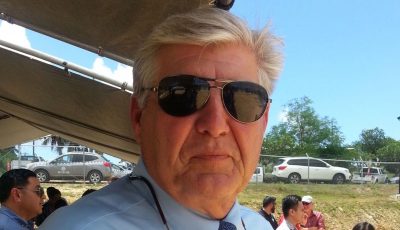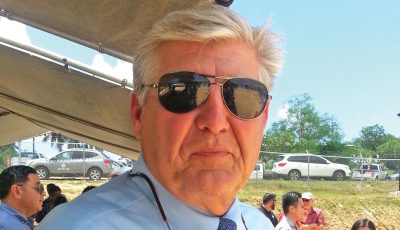Report: CUC failed to adopt changes to rates due to absence of PUC since 2014
Report finds CHCC owes over $50M in utility bills to CUC to date
Without a functioning regulatory commission since 2014, the Commonwealth Utilities Corp. has been unable to adopt changes to its rate schedule to achieve full-cost recovery and financial sustainability as required by law, according to a report prepared by the CUC Transition Team.
The report, a copy of which was obtained by Saipan Tribune yesterday, also noted, among other issues, that the Commonwealth Healthcare Corp. owes CUC more than $50 million to date.
Rep. Vincent Aldan (Ind-Saipan) served as the team leader of the CTT.
Among the CTT recommendations for the administration of Gov. Arnold I. Palacios and Lt. Gov. David M. Apatang is to petition the U.S. District Court for the NMI, the U.S. Environmental Protection Agency, and the U.S. Department of Justice to rescind the waiver of qualifications for the position of CUC’s executive director.
CTT also recommended to petition the federal court, EPA, and DOJ for the appointment of a qualified interim executive director, while the CUC board of directors searches for a permanent executive director who meets the required qualifications.
The CTT also determined that CUC has accomplished milestones as part of its energy management solutions for an improved power generation program.
On the subject of the Public Utilities Commission, which is tasked with regulating CUC as a utilities firm, the CTT found that the commission lacks a quorum, and has failed to function effectively in the absence of a quorum and sufficient budgetary resources since 2014.
Commonwealth law created the PUC as an independent agency within the Executive Branch composed of five appointed members. Its primary role is to exercise regulatory oversight over utility entities, including CUC, as to “all rates, fares, fees, charge, services, rules, conditions of service, and all other matters pertaining to the formation, operation, and/or direction of a regulated entity.”
The CTT determined that CUC and PUC do not have a board quorum to approve any Fuel Adjustment Charge greater than 4.5%, even as fuel costs have risen greater than 4.5% in the last two fiscal years.
The CTT recommended that the Palacios-Apatang administration immediately appoint within its first 100 days in office qualified individuals to the PUC to establish the required quorum in reviewing and approving rates that will allow CUC to perform cost-recovery measures.
With respect to CHCC’s over $50 million debt, the CTT noted that factored into negative revenue over expenses recovery is CHCC’s failure to meet payments of its utilities bill.
The CTT recommended to the administration to include on its list of priorities reaching a settlement resolution with CHCC on more than $50 million in collection arrears to shore up CUC’s financial standing.
The CTT also recommended prioritizing filling the CUC board of directors so it could establish a quorum, hiring a qualified executive director, and executing CUC functions as required by law and by CUC policy rules and regulations.
The CTT noted that the lack of quorum in CUC’s board of directors inhibits CUC from setting the appropriate rate structures, executing procurement solicitations and other important functions that allow the corporation to address infrastructure enhancements, maintenance, and other critical services.
The current members of CUC board include Janice Tenorio of IT&E, former Imperial Pacific International (CNMI) LLC chief executive officer Donald Browne, and Tinian mayor chief of staff Allen Perez. The Senate has yet to confirm the administration’s appointees to the CUC board.
Last Feb. 21, CUC executive director Gary P. Camacho resigned as executive director, to take effect upon the expiration of his contract on March 26, 2023.
Also on that same day, Feb. 21, CUC pro tem board chair Janice Tenorio designated Dr. Dallas M. Peavey Jr., deputy director for electric power systems, as acting executive director “until further notice.”
The CTT stated that significantly, the executive director position, recognized by EPA and DOJ as CUC’s “singularly most important position,” was filled by Camacho, who does not meet the minimum qualifications set in CNMI law or the federal stipulated orders.
In 2017, then-governor Ralph DLG Torres and the CUC board petitioned the federal court to temporarily waive the qualification requirements in the stipulated orders so CUC can hire Camacho as executive director.
The CTT noted that the DOJ and EPA entered into a stipulation with CUC in which EPA indicated that “it did not approve but will not object” to Camacho’s appointment, and CUC agreed to continue to seek candidates for future position vacancies who meet or exceed minimum qualifications in the stipulated orders. The joint stipulation did not modify the stipulated orders.
As for CUC’s milestone accomplishments, the CTT noted the execution of a contract to acquire an 8.7-megawatt Man Diesel generator to replace the old Engine 4 in Power Plant 1 in Lower Base, and the allocation of government funding through the American Rescue Plan Act to secure a second 8.7 MW generator to replace Engine 5 in Power Plant 1.
The CTT also mentioned the installation of three turbochargers at Power Plant 1 to increase engine efficiencies, lower fuel consumption by 5% and lower operational cost for power supply; and making foundation repairs for three diesel engines at Power Plant 1 to prevent damage and enhance the performance of the engines.



























